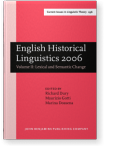Disseisin: The lexeme and the legal fact in Early Middle English
Revealing the processes of vernacularising the prefix dis- in English requires attention to each lexeme which uses it. This article explores the term disseisin and its associated lexemes from its earliest uses to about 1200 AD. The historical dictionaries suggest that disseisin is the earliest discompound in English. Elucidating its history requires more however than consulting a historical dictionary or amassing corpus data. I show that the differences between lexemes casts doubt on the standard accounts.
The present data suggests that the seiz- disseis- lexemes may predate the dictionary evidence. Other sources reveal a rich legal background and enough tokens to suggest patterns of usage. It seems that, since seisin/disseisin is an antonymic pair only in legal fact, not in connotation, disseisin is privative but not necessarily pejorative. Since the language boundaries in England between French, Latin, and English were not simple, we should consider individual situations, writers, and individual lexemes wherever possible.
